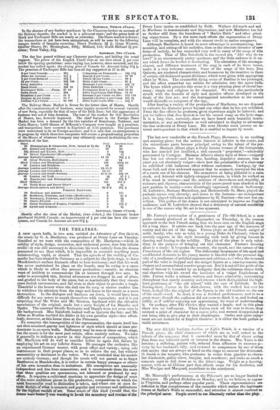Mr. Farreu's personation of a gentleman of The Old School,
in a new petite comedy produced at the Haymarket on Thursday, is the nearest approach to the best French acting that we have seen on the English stage for a long time. It carries one back into the past age of the manners of society and the art of the stage. Farren plays an ad French emigre of noble family, who acts as valet to a young Duke de Choiseul; whom he secretly supports in the style becoming such rank by giving lessons in dancing and fencing to the nobility. The plot of the piece is only subsi- diary to the purpose of bringing out this character. Farren's dressing alone is a study: it bespeaks the country, the epoch, and the nature of the Frenchman of the old regime. The deferential demeanour of the aged and, confidential domestic to his young master is blended with the personal dig- nity of a gentleman of polished manners and address; and when the assumed part of the valet is dropped and the emigre figures as a dancing-master, the elegant and accomplished courtier peeps out. But it is not till the pride of the man of honour is wounded by an indignity that the nobleman shines forth, and chastises with his sword the insolence of a vulgar Englishman of title. Farren walks a minuet, waltzes, and fences admirably; maintaining throughout that stately courtesy and retenue which distinguished the high- bred gentleman of "the old school," with the case of habitude. In the fencing-bout, Farren in his shirt-sleeves, with the cocked hat over his brow, looked like the original of the figures in the old treatises on the use of the small-sword. In short, it was a finished performance; and to us a great treat: though the audience did not seem to think it so, and looked on coldly, as if neither enjoying nor appreciating, for want of understanding it. Or perhaps, after The Cricket, they wanted a laugh; and in this piece there was no buffoonery. When Farren took off his coat to fence they mistook a point of character for a coarse joke, and seemed disappointed at not being able to give play to their diaphragms. Smiles and quiet enjoy- ment are not looked for at English theatres: it is either the loud guffaw or stolid endurauce.


























 Previous page
Previous page